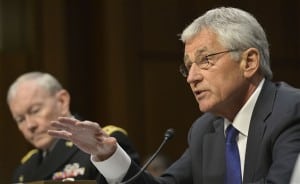
Defense Secretary Chuck Hagel said Thursday the decision for him to resign was a mutual one arrived at in private discussions with President Barack Obama and not based on any “major” differences between the two men. “There were no major differences in any major area. Sure, there are always issues of style and how you get things done and are things moving fast enough,” Hagel said, describing Obama as “thoughtful” and “careful.” “This was a mutual decision based on the…













